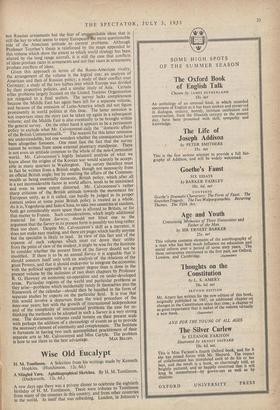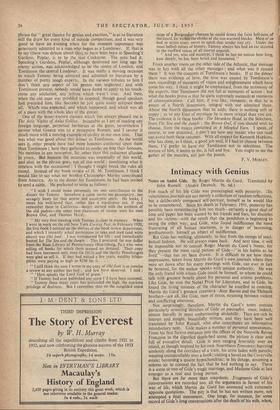Wise Old Eucalypt
H. M. Tomlinson. A Selection from his writings made by Kenneth Hopkins. (Hutchinson. 12s. 6d.) A Mingled Yarn. Autobiographical Sketches. By H. M. Tomlinson. (Duckworth. 12s. 6d.) A FEW days ago there was a private dinner to celebrate the eightieth birthday of H. M. Tomlinson. There were tributes to Tomlinson from many of the counties in this country, and from other countries in the world. In itself that was refreshing. London, in Johnson's
phrase the " great theatre for genius and exertion," is as to literature still the draw for every kind of outside competition, and it was very good to have an evening when for the moment supremacy was generously admitted to a man who began as a Londoner. If, that is to say (there was debate about this), to have been born in Speeding's Gardens, Poplar, is to be the real Cockayne. The ayes. had it. Speeding's Gardens, Poplar, although destroyed not long ago by enemy action, was acknowledged to be the centre of London, and Tomlinson the central Londoner. it was really a moving occasion to watch Tommy being admired and admitted to literature by a number of pretty tough experts. In the various tributes to him I don't think any aspect of his genius was neglected ; and with Tomlinson present, nobody would have dared to apply to his touch- stone any adulation, any tribute which wasn't true. And then, when the old man was prodded to respond, though good speakers had preceded him, like Socrates he just quite easily eclipsed them all. Which was expected, and which happened, and which was all of a piece with the whole idea of the dinner.
One of the lesser-known classics which has always pleased me is The Attic. Nights of Aulus Genius. Incapable as I am of reading any foreign language, perpetual barbarian at the gates, nevertheless I savour what Greece was to a perceptive Roman, and I savour it much more with a moving example of civility in our own time. That was what was good about this dinner to Tomlinson. As the world sees it, other people have had more honours conferred' upon them than Tomlinson ; here they gathered to confer on hint their honours. No mention in any newsprint, Sir, other than this indiscreet allusion in yours. But because the occasion was essentially of this world, and also, as the phrase goes, out of this world ; combining what is timeless with the occasional ; I thought I might break the rules all round. Instead of my book review of H. M. Tomlinson, I think I would like to say what my brother Christopher Morley contributed from America. As to the dinner for Tomlinson, he had been invited to send a cable. He preferred to write as follows :
" I wish I could make personally my one contribution to the
dinner for Tommy. Somehow a cable seems too peremptory, too savagely hasty for that serene and eucalyptic spirit. He looks, I mean his well-loved face, rather like a eucalyptus nut, if you remember them in California—deeply incised with the emblem of the old padres—the other two likenesses of course were his own Brown Owl, and Thomas Hardy.
" My very first meeting with Tommy is clear in memory. When
I went to work on the old New York Evening Post, in February 1920, the first book I noticed on the shelves of the book review department, and which 1 instantly asked permission to take and read (and write about) was Old Junk. I was transported for life ; and immediately hunted for The Sea and the Jungle. This I procured for one dollar from the State Library of Pennsylvania (Harrisburg, Pa.) who were selling off books for which there seemed no demand. Their copy had been borrowed only once (in 1913) and the thrifty Pennburgers were glad to sell it. If they had waited a few years, wealthy biblio-
philes were paying as high as $250 for• it. . . .
" I still think the note I Wrote in my copy of OYd Junk is as concise a review as any author• has had ; and few have deserved. I said : " Here speaks the Lord God of prose.' " If Tommy had ever published any verse I'd have been stumped. " Tommy these many years has pretended the high, the supreme privilege of deafness. But 1 remember that on the sungilded stone steps of a Burgundian chateau he could detect the faint bell-note of the lizard, far within the chinks of the sun-warmed blocks. Most of us had to strain every nerve to catch that tender tiny cry. Under the most hellish noises of history, Tommy always has had an ear attuned to the muffled voices of all mortal anguish.
" And yet, wise old eucalypt, 1 think he has no notion how long, how deeply, he has been loved and honoured."
From another room on the other side of the Atlantic, that message was in key with all the -other messages ; and what was it caused them ? It was the contents of Tomlinson's books. If at the dinner there was evidence of love, the love was caused by Tomlinson's own recordings of moments of vision and enlightenment which have come his way. I think it might be emphasised, from the testimony of the experts, that Tomlinson did not fail at moments of action ; but what the books prove is that he quite supremely succeeds at moments of communication. Call him, if you like, romantic, in that he is aware of a fourth dimension, integral with our admitted three. About the fourth dimension that he adds, there is nothing soft or soppy ; as to any kind of mystique he is more critical than you are. The evidence is in these books : The Shrunken 'Bead, in the Selection, from The Sea and the Jungle ; the Brown Owl, if you should wish to choose, from the essays contained in A Mingled Yarn. I speak, of course, as one attainted. I don't see how any reader who can read can avoid both these volumes. With all respect for Kenneth Hopkins, who has done, as 1 think, a good job well, if I had to choose between them, I'd prefer to have my Tomlinson not in selections. The texture of him, it seems to me, is full and bye. You ought to see the gather of the muscles, not just the punch.
F. V. MORLEY.



























































 Previous page
Previous page